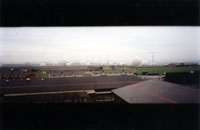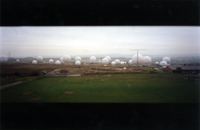
Menwith Hill was first established to intercept traditional radio
signals, but this is now only a tiny part of its activities. Current
activities are conducted under two systems - SILKWORTH
and MOONPENNY. Its primary targets are Europe, northern
Africa and western Asia. This is because satellites which are
positioned to provide communications in these regions are
visible from Menwith Hill, but would not be visible from the
United States.
The SILKWORTH system, established in 1979, uses specially designed satellites stationed over target areas to intercept long distance microwave radio communications. Apparently operated entirely from Menwith Hill using large satellites positioned over the Equator, SILKWORTH intercepts long distance microwave radio relay links between cities in Eurasia and relays them back to Menwith Hill.
Operators at Menwith Hill can monitor messages and conversations passing between companies and individuals within, say, Jordan or the Ukraine. Other international messages and conversations being conveyed by the same route can also be intercepted. Satellites can be directed to intercept and relay selected links and the received communications are then sorted and processed at Menwith Hill to select those that satisfy specific criteria. All forms of communications are intercepted and processed. Menwith Hill controls 56 satellites and a series of radomes, known as the RUNWAY running east and west across the south edge of Menwith, are believed to be involved in downloading information from the geosynchronous satellites known as VORTEX or MAGNUM and from larger, more advanced systems such as those known as ORION. STEEPLEBUSH II, a subterranean, radiation-hardened facility, processes information from the RUNWAY satellites.

The MOONPENNY system is the unauthorised reception of
ordinary satellite communications used by other countries. It
consists of interception terminals placed so as to intercept the
signals broadcast to the earth's surface by national or
international communication satellites. These may include
satellites launched by single nations, such as Russia or
Israel, or by groups of nations, such as ARABSAT, or by the
international community as a whole (INTELSAT). Because
the ordinary function of these satellites is to broadcast their
signals to earth, no special equipment needs to be placed in
space to intercept them.
The NSA aims to collect, examine and process all international (and many national) communications. The scale of the collection system was described by the former Director of the NSA, Vice Admiral William Studeman, in 1992. At that time the NSA's collection system generated about 2 million intercepted messages per hour. Of these, all but about 13,000 an hour were discarded. Of these about 2,000 met forwarding criteria, of which some 20 are selected by analysts, who then write 2 reports for further distribution. Therefore, in 1992 MHS was intercepting 17.5 billion messages a year. Of these some 17.5 million may have been studied for analysis.
Prior to extensive automation, sorting of messages was carried out by reference to a list of targets, known as a "watch list". In the last decade, this list has evolved into a system called project ECHELON. In this system computers, known as DICTIONARY are used to select messages which may include combinations of specific names, dates, places, subjects etc. DICTIONARY automatically searches through intercepted messages looking for particular subjects and people from target lists. Those matching particular criteria are sent for further processing by analysts. Key words for message interception are numerically coded and include diplomatic messages as well as regional communications.
ECHELON was first revealed by Duncan Campbell in 1988 in a 'New Statesman' article and detailed in 'Secret Power' by Nicky Hagar in 1996. The existence of the ECHELON system has been officially confirmed in a report commissioned by the Civil Liberties Committee of the European Parliament. The report, called "Assessing the Technologies of Political Control", also calls for an investigation into the activities of the NSA at Menwith Hill.
